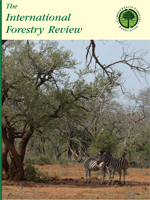The Democratic Republic of Congo (DRC) with its extensive forest cover is the biggest target country for the Reducing Emissions from Deforestation and Forest Degradation (REDD ) mechanism in Africa. Despite high levels of gender inequality in rural DRC, the impacts of REDD interventions on gender have not been sufficiently addressed.
This study examines the gender dimension at two project sites in the Equateur Province. Focus group discussions and individual interviews reveal that women spend as much time as men in the forest. Nonetheless, men's activities in the forest are often much more highly valued. This systemic devaluation of women's work, and their knowledge about the forest, legitimises men's dominance in forest governance. The results of this study finds that alongside investment in women's education, which is central for women's empowerment and their participation in forest management, local opinion leaders who shape social norms and perceptions, such as church-based organisations, are indispensable partners to make REDD more equitable.





